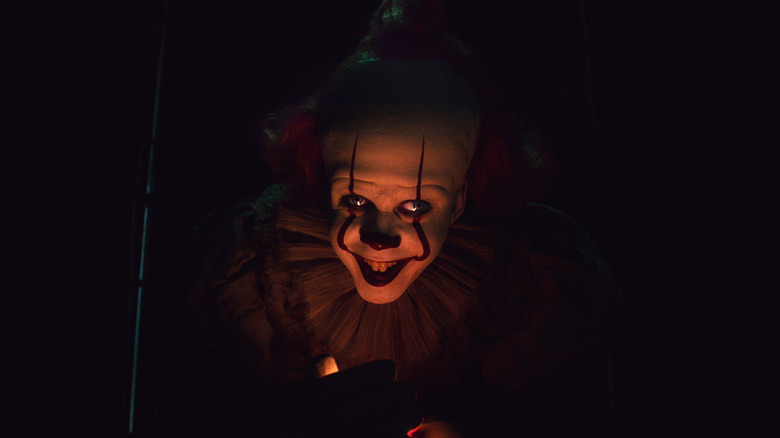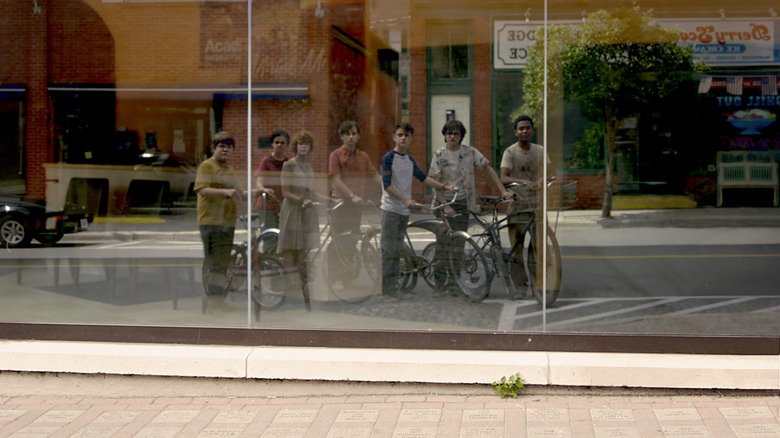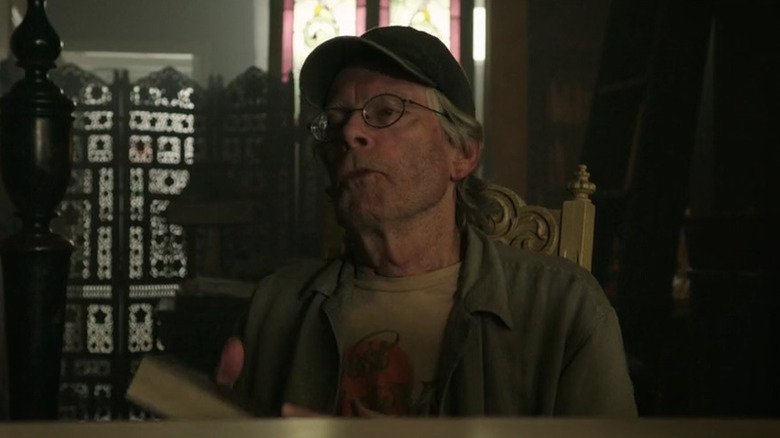Why Stephen King Had The Perfect Cameo In It: Chapter Two
"It" became a cultural phenomenon when it hit theaters in 2017, extending far beyond the usual horror crowd becoming a must-see cinematic event. It re-invigorated Hollywood's interest in Stephen King's work and, naturally, paved the way for a sequel, 2019's "It Chapter Two," that finished telling the story contained within the author's beloved, lengthy novel. It also created a very unlikely $1 billion franchise in the process, cementing itself in the history books.
What viewers not familiar with King's work (and therefore his author picture) may not have noticed is that the author himself actually has a pretty hefty cameo in "It Chapter Two." This is not merely a "blink and you'll miss it" moment like some of Stan Lee's cameos in the Marvel films. This is a full-blown scene that allows King to chew some scenery and take a victory lap. But there's more going on here than meets the eye.
The Cameo In Question
The scene takes place well into "It Chapter Two," with the reunited adult members of the Losers Club attempting to perform the Ritual of Chud so that they can vanquish Pennywise for good. This involves each member of the group finding a totem, an important item from their childhood that contains some significance. Bill (James McAvoy) comes across his trusty old bike in a second-hand shop's window. When he walks inside, clearly stricken with good memories, he then asks the shopkeeper about the bike. And the man who runs the shop is none other than Stephen King.
The shop owner recognizes Bill, who is now a famous horror writer (sound familiar?), and they proceed to bargain over the price after he takes a pot shot at Bill's inability to write good endings. It's a humorous scene that helps to add some levity before the film's final act. But it's also a pretty big showcase for King as he gets to chew the scenery a bit in a blockbuster sequel based on one of his most famous books. It's a nice tribute to the man who made this all possible. But there's a little more to it than that.
A Slightly Deeper Meaning
King is one of the most successful and prolific authors of all time, and for decades now, he has churned out hit after hit, classic after classic. To say that his track record is impressive would be an understatement. Yet, his run in Hollywood has been a huge mixed bag. Many of the movies based on his works were modestly successful at best. And even the most successful, "The Shining," diverted heavily from the source material and served as a pretty big disappointment for King.
So when director Andy Muschietti's "It" hit theaters in 2017 and was met with critical praise on its way to a record-shattering $700 million at the box office, it was a gigantic deal. And this movie had the added benefit of King's approval. He has gone on record saying that he was a fan of what Muschietti did, and this role serves as a big victory for a man who has had such influence over pop culture for so many years. Hollywood finally caught up to him in proper fashion.
It would have been very easy to just have King walk by in the background or have him deliver a quick line. The fact that he gets to have a fun, reasonably lengthy scene that has influence over the film's outcome is a big tip of the cap to the man who created this beloved story. It was the right thing to do and the movie is all the better for it.
A Knowing Tip of the Cap
However, there is another crucial wink and a nod going on in this cameo. As many readers of King's work have noted over the years, his endings often don't live up to the book itself. Sometimes they just fall flat. In other cases, they just go completely off the rails. "It" is a perfectly fine example, with the whole gargantuan book culminating with a giant alien spider that is defeated by having its heart destroyed (not to mention a certain sewer encounter between the kids that is best left un-described here). There is also the matter of straight-up blowing up the Overlook Hotel at the end of "The Shining," which is wildly different from what Kubrick did in his movie adaptation.
Taking that into account, the fact that this meaty cameo sees King playing a character who is criticizing an author's work, in particular his endings, is pretty meta. It adds even further meaning to King's participation onscreen in the film, and serves as an acknowledgment from the author to his critics. Though the author, taking to Twitter in 2019, also addressed that head-on without mincing words: "Of course for years some people have told me I don't know how to end a story. I call bulls*** on that, but everyone has an opinion."
Looking at that tweet, the cameo and scene become even more magnified in the larger context of any conversation that can be had about King's work. The man clearly doesn't feel that the criticisms of his work are all that valid, which makes this scene pretty tongue-in-cheek. King knows this is an ongoing thing, and he chooses not to let it affect his work ... but he's more than happy to acknowledge it for the sake of cinema.


